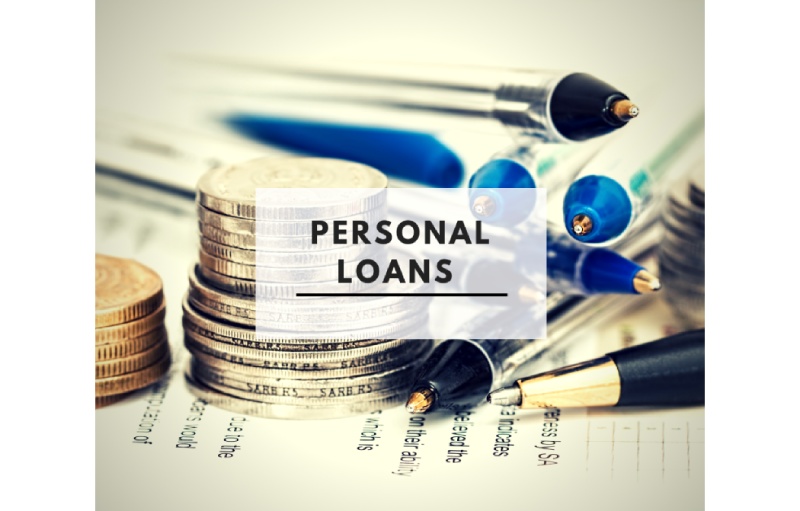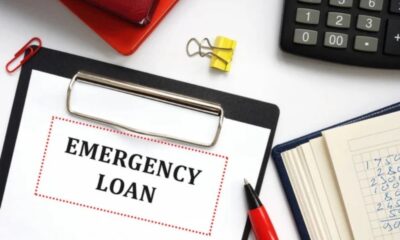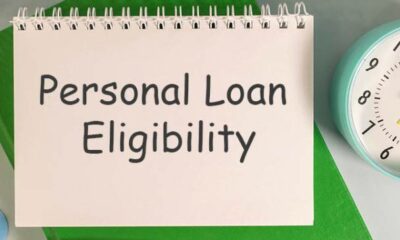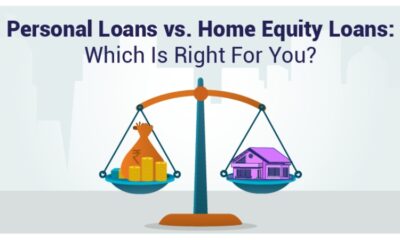Business
Get a Personal Loan? These are the Advantages and Disadvantages

A personal loan’s proceeds can be utilized for a variety of things, such as paying for medical bills and consolidating debt. Additionally, if you require money quickly, they might be a good option. Certain lenders offer same-day business-day deposits into your account. Furthermore, average interest rates are generally less than those associated with other debt types, such as credit card debt.
However, personal loans come with disadvantages just like any other financial product. If you borrow money, for example, you may have to pay hefty fees from certain lenders. To decide if taking one out is the best financing option for you, you should consider the advantages and disadvantages.
Pros
- One big payment.
- Fast funding time.
- No collateral requirement.
- Reduced interest rates.
- Adaptability and versatility.
- Extended loan terms.
- Simpler to manage.
Cons
- Interest rates may be more expensive than alternatives.
- More eligibility requirements.
- Penalties and fees may be high.
- Additional monthly payment.
- Increased debt load.
- Higher monthly payments compared to credit cards.
- Potential credit damage.
Advantages of personal loans
When compared to other loan types, personal loans can have advantages. A few benefits of choosing this type of financing over alternatives are listed below.
- One big payment
It may be simpler to use the loan all at once for a big purchase, debt consolidation, or other purposes because you receive it all at once. In addition, the loan will be simpler to manage because you’ll receive a fixed interest rate and a predictable monthly payment.
- Fast funding times
Compared to secured loans, personal loans typically have quicker approval and payment schedules. They are therefore helpful in cases of emergencies or other sudden financial needs. As early as the following business day, some lenders can deposit the loan proceeds into your bank account.
- No collateral requirement
Collateral is not needed for unsecured personal loans to be approved. You will suffer serious financial and credit repercussions if you are unable to repay an unsecured loan by the conditions set forth by your lender.
But with secured loans, you have to use an asset (collateral), such as your house or vehicle, to cover the remaining amount. The lender may take your asset to recoup the outstanding amount if you don’t make payments.
If you default on an unsecured loan, the lender is not allowed to seize your collateral.
- Reduced interest rates
Interest rates on personal loans are frequently lower than those on credit cards. The average rate on a personal loan is 12.21% as of May 2024, whereas the average rate on a credit card is 20.68%.
Rates on personal loans for borrowers with good credit range from 10.73 percent to 12.50 percent. Additionally, you might be able to get a loan larger than the credit card limit.
If you take out a personal loan rather than a credit card and have good credit, you might be able to save money on interest. However, that would only apply if your credit card was balance-balanced. You might be able to avoid paying interest altogether if you can use your credit card and pay it off during the grace period.
- Adaptability and versatility
Certain loans are restricted to specific uses. For example, you are limited to using an auto loan toward the purchase of a vehicle. Personal loans can be used for a variety of things, such as paying for medical expenses and debt consolidation.
When financing a significant purchase, a personal loan can be a good option if you don’t want to be restricted in how you use the money. Verify the permitted uses of the loan with your lender before applying.
- Extended loan terms
Personal loans have terms ranging from two to ten years, depending on the lender, in contrast to short-term loans with high interest rates, such as payday loans. As a result, you might be given a fair monthly payment and plenty of time to pay back the money you borrow.
The monthly payment may be more manageable with longer loan terms. Just bear in mind that the longer the loan term, the higher the total interest you will pay.
- Simpler to manage
Borrowers sometimes use personal loans to combine debt from various credit card accounts. Several credit cards with various interest rates, payment deadlines, and other variables are more difficult to manage than a single personal loan with a fixed monthly payment.
To simplify their monthly payments and save money, borrowers can apply for a personal loan with an interest rate that is lower than their credit card interest rate.
If you are eligible for a personal loan that has a lower interest rate than your current debt, you could be able to save thousands of dollars in interest.
Disadvantages of personal loans
Not every financial circumstance calls for a personal loan.
- Interest rates may be more expensive than alternatives
Personal loan interest rates aren’t always the lowest around. This is particularly valid for borrowers with poor credit.
A lender is more likely to charge you a high-interest rate if your credit is poor. As a result, compared to someone with excellent credit, you might wind up paying thousands more in interest. The rate on a secured loan may be lower.
- More eligibility requirements
The requirements for personal loans may be stricter than those for other kinds of funding. If you have a short financial history or bad credit, there will be fewer lenders available to you. In contrast, the lender will probably give more weight to the value of your home than to your credit score if you apply for a home equity loan.
Your chances of being approved could be increased by adding a co-signer or co-borrower with a better credit score than you. Some lenders, though, forbid this.
- Penalties and fees may be high
Penalties and fees associated with personal loans can increase borrowing costs. Origination fees on certain loans range from 1% to 12% of the total loan amount. Fees for loan processing can be deducted from the amount credited to the borrower’s account or rolled into the loan itself.
If you pay off the remaining balance before the end of the loan term, some lenders impose prepayment penalties. Examine all costs and penalties associated with any personal loans you are thinking about before applying.
- Additional monthly payment
A personal loan adds another payment to your monthly expenses. Make sure the loan payment fits comfortably into your present and future financial plans before taking out a loan. While computing your monthly payment, don’t forget to factor in the interest rate, principal, and any associated costs.
If you take out more debt than you can afford, a personal loan may put a strain on your finances.
- Increased debt load
While credit card balances and other types of debt can be consolidated with personal loans, the underlying cause of the debt is not addressed. By using a personal loan to pay off your credit cards, you can increase your credit limit. It can be tempting, if you’re not careful, to accumulate more debt instead of concentrating only on paying it off.
While taking out a personal loan can help you pay off high-interest debt, if you don’t change your poor spending habits, it can make your debt worse.
- Higher monthly payments than credit cards
Credit cards have no maximum payment amount and a low minimum payment required each month. Personal loans have larger fixed monthly payments that must be repaid by the loan’s expiration date.
You run the risk of defaulting if you combine credit card debt into a personal loan and are unable to make the necessary adjustments to your loan payback schedule and higher payments.
Depending on your finances, higher monthly payments may be more challenging to manage. You may therefore be more likely to default on the loan.
- Potential credit damage
The lender will perform a hard credit inquiry when you apply for a loan, which will lower your score by a few points. Furthermore, if you miss payments, your credit score will suffer severely.
The initial decline, though, is brief. As you settle your debt and make monthly payments, your credit score ought to rise. Thirty percent of your FICO Score is derived from your amount owed, while the remaining thirty percent is based on your repayment history.
A substantial credit decline is probably in store for those with a poor repayment history and a high debt-to-income ratio. Because of this, getting approved for a mortgage or auto loan may be challenging.
When a personal loan might be right for you
Here are some tips to help you decide if a personal loan would be a good choice for you after you’ve looked into your options and potential rates:
- Your credit score is excellent: Good credit borrowers are eligible for the lowest interest rates.
- Your goal is to settle high-interest debt: Paying off expensive credit card debt can be accomplished through the use of personal loans.
- The money will be used for essential costs: Paying for unexpected costs or home renovations are two more excellent reasons to use personal loans.
When to look for an alternative
Alternative loans may be a better option in certain situations, as personal loans are not the only way to get financial support. These are the three primary scenarios in which taking out a personal loan may lead to future financial difficulties.
- You’re prone to overspending: It might not be wise to use a personal loan to pay off your credit cards if you’ll just end up taking on more debt.
- The monthly payments are beyond your means: Think about the monthly payments and repayment schedule for a personal loan. To find out if you can afford the monthly payments for the term you’ll be paying it off, use a loan calculator.
- You don’t require the cash right now: To finance a major purchase, it might make more sense to increase your savings than to take out a personal loan and pay interest over an extended period of time.
Conclusion
Getting a personal loan entails significant financial commitments and needs to be handled accordingly. Plan the use of the money and, more importantly, the repayment of it, considering interest.
To compare interest rates and loan terms, obtain quotes from several lenders if you’re thinking about taking out a personal loan. Remember to read the fine print, which includes any fees or penalties. After gathering all the information, determine whether taking out a personal loan is better than not taking it out.
-

 Business3 weeks ago
Business3 weeks agoPrakash and Kamal Hinduja: Driving Social and Environmental Change
-
Education4 weeks ago
Fred DuVal: University Leadership as a Critical Resource for Climate Change Research and Life-Saving Solutions
-

 Health3 weeks ago
Health3 weeks agoThe Hinduja Brothers Commitment to Global Health: Empowering Communities Across Borders
-

 Cryptocurrency3 weeks ago
Cryptocurrency3 weeks agoDesigned For The Masses: How Akasha (AK1111) Is Unlocking Crypto For The Next Billion Users
-

 Cryptocurrency4 weeks ago
Cryptocurrency4 weeks agoNexaglobal & Future World Token (FWT): Could This Be the Next Big Crypto Investment of 2025?
-

 Sports4 weeks ago
Sports4 weeks agoWomen’s NCAA Tournament 2025 Sweet 16: Full Schedule, Fixtures, Teams, Bracket, and How to Watch March Madness Basketball Match Live
-

 Startup1 week ago
Startup1 week agoCost-Saving Strategies Every Small Business Owner Should Know to Boost Efficiency
-

 Startup3 weeks ago
Startup3 weeks agoMatthew Denegre on the Art of Deal Sourcing: Finding the Right Investment Opportunities

























